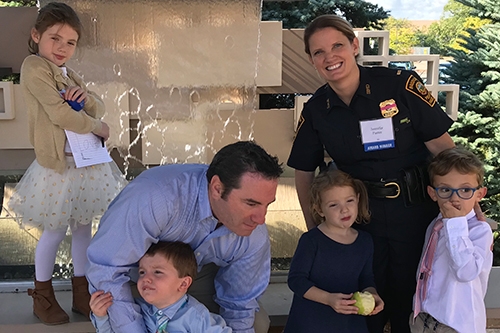Jennifer Canney Paster '98
MAJOR: Sociology with a minor in psychology
CURRENT POSITION: Head, crisis intervention team, Brookline Massachusetts Police Department
Jennifer Canney Paster ’98 is only the second woman in the history of the Brookline (Mass.) Police Department to attain the rank of lieutenant.
“When I started 19 years ago, the majority of my coworkers and supervisors were great, and I certainly didn’t face the obstacles that the women who came before me had to face,” Paster said. “I’ll always be thankful for those women who paved the way for me and others.”
“Women are definitely starting to take more visible roles in law enforcement,” she continued. “It’s so important for kids, especially teenage girls, to see people who ‘look like them’ in the careers they set out to obtain. The best compliment I ever received came when I helped a 5-year-old boy cross the street and I overheard him say to his mother, ‘Mom, I want to be a policewoman when I grow up!’”
Making this kind of impact is what it’s all about for Paster, who was promoted to lieutenant in 2017.
“I love helping people. On almost every shift I encounter someone having one of the worst days of their lives,” Paster said. “I have the training and the ability to help them navigate that problem. If I can leave someone a little bit better than I found them, then it’s been a good day.”
Currently head of the department’s Crisis Intervention Team, Paster oversees a relatively new approach to responding to people with mental health concerns. CIT officers are trained to deescalate situations and, when applicable, direct people into treatment instead of jail.
“When I started 19 years ago, we were arresting people for crimes like needle possession when it was obvious they were struggling with addiction issues, or we were arresting them for trespassing when their real issue was actually homelessness,” said Paster, who majored in sociology and minored in psychology at Union. “The result is that the three largest mental health providers in the nation are actually jails – Cook County, Los Angeles County and Rikers Island.”
“Across the country, our profession has taken a look at how we have operated historically, and it’s obvious to most of us that these types of arrests or incarcerations are in no way solutions,” she added.
So now, Paster and other CIT officers are doing their best to find better options.
“I spend a lot of time collaborating with district attorneys, defense attorneys and our judge to make sure that people are being treated as opposed to punished, when appropriate,” she said. “I respond to people and families following opiate overdoses to see if those struggling with addiction will engage in treatment. I collaborate often with local mental health service providers to help people in advance of crisis.”
Paster also helped form the Autism and Law Enforcement Coalition to foster deeper understanding of autism spectrum disorders among law enforcement. She teaches Rape Aggression Defense courses and is a member of the Massachusetts Association of Women in Law Enforcement and the National Association for Women Law Enforcement Executives.
When she thinks about her time at Union, she thinks of it fondly, remembering where she met lifelong friends and the impact of one particular professor.
“I think a lot about Professor Martha Huggins and how impressed I was by her strength and courage. She was an excellent mentor for me; a strong leader who really encouraged me to push myself,” Paster recalled. “As part of my senior thesis, we worked with the Schenectady Police Department and she arranged for me to go on ride-alongs to study police decision-making and discretion.”
“At time, I never would have considered a career in law enforcement, but I sometimes wonder if Professor Huggins saw something I didn’t. My senior thesis is sitting on the shelf in my office next to my law books, just to remind myself of how a 20-year-old saw not only my profession, but the world.”
Paster holds a master’s degree in criminal justice administration from Western New England University. When she’s not working, she likes to spend time with her husband, Mark, and their four children, Cora (8), Libby and Jack (5), and Graham (3).

